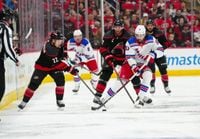It’s a season of questions, hope, and maybe a little frustration for the New York Rangers faithful as the franchise heads into the heart of the 2025 NHL campaign. With the Metro division looking more vulnerable than it has in years, the spotlight is shining brighter than ever on the Rangers’ roster decisions, the mental state of their highest-paid stars, and the path forward under the guidance of newly installed head coach Mike Sullivan.
But if there’s one topic that’s dominated fan debates and sports talk radio, it’s the ongoing scrutiny of Mika Zibanejad. The Swedish center, once the offensive heartbeat of the Blueshirts, has faced an avalanche of criticism after a tough season last year—a season in which, let’s be honest, the whole team struggled to find its rhythm. Yet as the new campaign unfolds, some prominent voices are calling for patience and perspective, urging fans and pundits alike to hit pause on the Mika bashing.
Stan Fischler, a respected voice in the hockey community, recently weighed in with a direct plea to the fanbase: “Can we stop already with the Mika (Zibanejad) hate,” he quoted Roundtable analyst Jess Rubenstein as saying. “Until we see what Mike Sullivan intends to do with the lines.” Fischler himself admitted, “The time has come for all of us to just shut up with the Mika Zibanejad talk. It’s wasteful, useless.” That’s not just a call for silence—it’s a call for a fresh perspective.
Backing up this sentiment, Roundtable member Mark Linde chimed in with a pointed reminder: “Everyone has to stop worrying about Mika, his exorbitant no-trade contract, and his status as a first-line player. True, he was a disaster last year – but so was the rest of the team. It’s up to coach Mike Sullivan – and the rest of his staff – to get Mika’s head back to believing that he can contribute like the player he was just two seasons ago. Sully has to find the right spot in the lineup for Mika to succeed; whether it’s the first line, second line, third line – center or wing – it doesn’t matter. Get him feeling positive about himself and this fresh start. Hopefully he will rebound.”
That’s the challenge in front of Sullivan, and it’s a big one. The Rangers’ new bench boss, known for his adaptability and player-focused approach, inherits a roster with more than a few moving pieces. Zibanejad, with his hefty contract and history of clutch performances, is just one of several high-profile players whose output will be under the microscope this year.
Yet, as Jess Rubenstein so succinctly put it, “Mika is not the only problem facing the Rangers. There are a whole bunch of issues!” That statement rings true for anyone who watched the team’s uneven performances last season. Defensive lapses, inconsistent goaltending, and a lack of scoring depth plagued the Blueshirts from October through April. The offseason brought changes, but the pressure remains—especially in a Metro division that, while weaker than in recent memory, still features plenty of hungry rivals looking to capitalize on any Rangers misstep.
Anthony Russo, in his August 26 piece, made a compelling argument that the Rangers’ fortunes this year may hinge less on their established veterans and more on the willingness to trust their young forwards. With the Metro division “in its weakest spot in a while,” as Russo notes, there’s a golden opportunity for the next generation of Rangers talent to earn bigger roles and make their mark. That means more ice time for the likes of Brennan Othmann, Will Cuylle, and perhaps even a surprise name or two from Hartford if injuries or slumps strike the main roster.
Russo’s article also highlighted the expectations swirling around the team’s five highest-paid players—a group that, naturally, includes Zibanejad. The logic is simple: when you’re taking up a significant chunk of the salary cap, you’re going to be expected to deliver. But as the team’s writers point out, it’s not just about goals and assists. Leadership, locker room presence, and the ability to mentor younger teammates are all part of the package. If Sullivan can coax the best out of his stars and blend that with the hunger of the Rangers’ up-and-comers, the team could be poised for a turnaround.
Of course, that’s easier said than done. The specter of last season’s disappointment still hangs over Madison Square Garden, and the fans’ patience is notoriously thin. Every shift, every line change, every power play will be scrutinized—especially if Zibanejad doesn’t find his game early. But the message from inside the organization, and from those who know the game best, is clear: don’t write off Mika just yet.
“It’s up to Sullivan and Z to make him the asset he once was; a challenge to be sure, but well worth one more try,” Fischler observed. The implication is that Zibanejad’s story with the Rangers isn’t over. Far from it. With the right support, the right role, and a little bit of luck, there’s every chance he can rediscover the form that made him a fan favorite and one of the league’s most dynamic centers not so long ago.
For now, though, the Rangers’ season remains a story in progress. The Metro division’s perceived weakness offers a rare window of opportunity, but only if the team can seize it. That means trusting the kids, holding the veterans accountable, and—perhaps most importantly—giving players like Zibanejad the space to rediscover their confidence without the weight of constant second-guessing.
As the puck drops on another crucial stretch of games, all eyes will be on how Sullivan juggles his lines and manages his stars. Will Zibanejad find his groove? Will the young forwards step up and seize their moment? And can the Rangers finally shake off the ghosts of last season and mount a serious playoff push?
One thing’s for sure: the conversation around Mika Zibanejad isn’t going away anytime soon. But maybe, just maybe, it’s time for the critics to take a back seat and let the hockey do the talking. The Rangers’ journey this season promises to be anything but dull—and as the Metro division landscape shifts, opportunity knocks louder than ever at Madison Square Garden.
With so much at stake and so many moving parts, the coming weeks will be telling. For now, hope and skepticism walk hand in hand through the corridors of MSG, as the Rangers look to write a new chapter—one shift, one line change, and maybe one Mika Zibanejad goal at a time.





